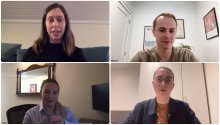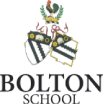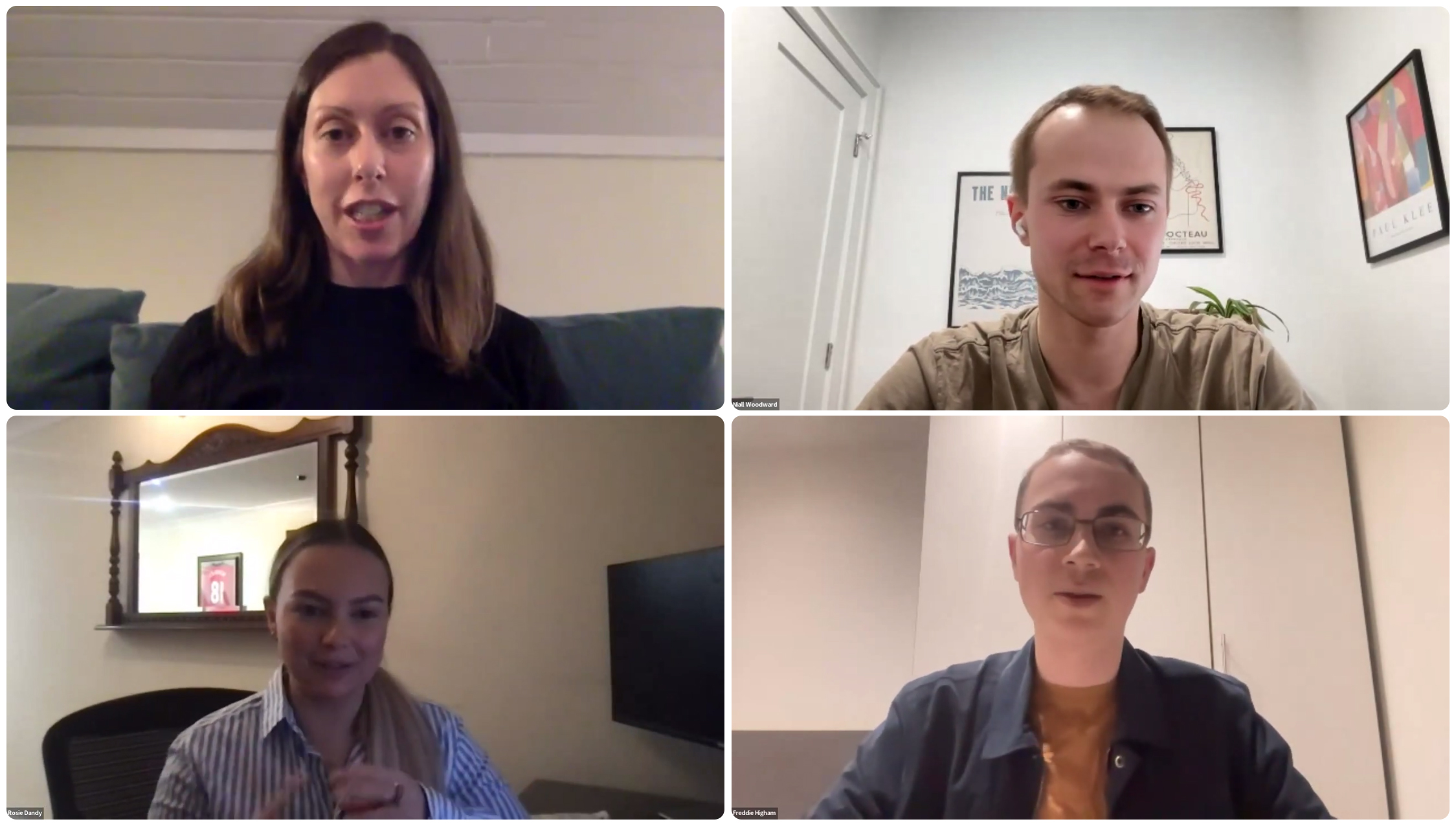
Head of Girls’ Division Mrs Lynne Kyle introduced the latest Perspectives lecture at Bolton School, which focussed minds on careers in the field of computer science and coding. The four former students, returning virtually for the public evening presentation, were introduced by Sixth Form student Lonique Mayoua, who is a Computer Science Prefect in the Girls’ Division.
Emma Arandjelović née Shepherd (Class of 1999) was first to present, recapping her career to date, which has seen her become a Senior Software Engineer for consultancy firm Observatory Sciences. Emma told how her role involves providing consultancy services to clients and how she is currently involved in the software development effort for the world’s largest radio telescope, SKAO. It is a job which involves travel, she said, and she is looking forward to a forthcoming visit to India to discuss the project.
Emma explained how, after studying A levels in Maths, Computing and English Language, she graduated with a First Class degree in Computer Science from Warwick. Her first position was as a software engineer at IBM in Hursley. She said she found it to be a great launching point for her career and that she enjoyed the focus on training and software development in the real world. She recalled how she found her next job through the New Scientist magazine, which saw her joining a team tasked with building the UK's national synchrotron, Diamond Light Source. She felt that her work helped facilitate a great science project and she enjoyed being part of a multi-disciplinary team. This job pivoted her career towards control systems engineering, and she went on to spend four years working in a similar role in Melbourne at the Australian Synchrotron. Emma has also completed a music degree with the Open College of the Arts and works part time as a composer.
Considering why students should choose a career in this field, Emma said that Computer Science pervades all walks of life and you can choose to work in an area that suits you, be that science, or sports or the arts or wherever. It’s fast pace and constantly changing nature are also appealing factors for her. Emma felt, in order to succeed, you need to be adaptable, to be willing to constantly learn, to be good at working in teams and to be good at problem-solving. It is helpful, she said, if you have an analytical, logical mind but, the ability to be creative is also much sought after.
Miss Lisa Jones, Director of Careers and HE in the Girls’ Division, compering the evening, introduced 26-year-old Niall Woodward (Class of 2016) as the next speaker.
Niall explained how he became Co-Founder and CTO of SELECT, a business-to-business software product, which helps customers optimise and monitor their Snowflake cloud data warehouse.
Reflecting on his school days, Niall recalled how he always had an interest in building things, in electronics and in computing and how he studied Maths, Physics and Electronics at A level. When he went to university, it seemed obvious that he should study Electrical and Electronic Engineering, which he did at Imperial College London. He then went on to become a data engineer at a consultancy and a number of small start-ups. He told how he is an open-source enthusiast, creating and maintaining several projects over the years. He commended the audience for attending the presentation, telling them that it is a good idea to keep your options open and that one Computer Science career can be completely different to another.
Niall spoke about his career path prior to setting up his own business, recalling applying for Computer Science internships as a student and securing a summer placement in his second year at Evolve Dynamics. He remembered too his time at Nested, a digitally enabled estate agents based in London. He told how he is a little impatient and enjoyed the quick feedback time involved when working in Computer Software. He touched upon his time in a broad software engineering role which involved lots of teamwork and a later full stack engineering role. Niall told how, post-Covid, he took a job working for a company called tails.com that sent out dog food tailored to your dog. He had, he said, a role as a Data Engineer for a year and a half and was involved in behind the scenes building of apps that moved data into a place where people could do analysis on it to build insight for the business and products. He also spoke about working for an analytics consultancy, which gave him a chance to gain more experience with domains, working with 4 or 5 clients at once. He used a variety of different tools whilst working remotely with the US firm. Niall recalled finishing with them at the end of 2022 and then, six months later, launching his own business, which now has 50 customers.
Considering why young people should consider a career in the field, Niall said it gives you the flexibility to work on a whole bunch of problems with a wide range of companies, that the sector pays well and that there are lots of flexible benefits. He said there are lots of people currently hiring and that as a job seeker you need a good awareness of business. He advocated needing problem-solving skills in general and that any Engineering background is good but you don’t necessarily need to have been to university to work in the sector.
Rosie Dandy (Class of 2019) introduced herself as a Business Analyst at AstraZeneca. She told how, straight after school, she had pursued a four-year IT Degree Apprenticeship at AstraZeneca, graduating with First Class Honors in Digital and Technology Solutions from Manchester Metropolitan and how she now plans on doing a Masters in IT Consultancy. Despite no IT background, Rosie won Best Overall Mark, Best Performing Student and Outstanding Project awards.
Rosie said that after school she had wanted to kickstart her career and that IT excited her – she had been excited by where it might take her. She explained how she changed job roles and departments every eight months in AstraZeneca. Recapping her career to date, Rosie told how she started as a Project Support Officer, which gave her a good oversight of the organisation. She told how she helped create apps for logistics within the company and how, during her time in the Global External Sourcing department she helped decide how the company would distribute the Covid vaccine across the world. She also spoke of time as a Digital Transformation Project Manager, of joining the Pharmaceutical, Technology and Development team and of becoming a UX Research and designer, where she enjoyed the experience of dealing face to face with patients. Rosie said she has realised that she is good at connecting people. She told how her time in Operations saw her helping create drugs and package them and how the project was then scaled up for Sweden and the US. Reflecting upon her graduation last summer, she said it was easier because she had experts around her who could guide her in her work. She hoped that her Masters would open even more doors for her. As a passionate advocate for Women in STEM, Rosie encouraged the young pupils to challenge tech career stereotypes.
Addressing the question of why choose a career involving Computer Science, Rosie said there are so many possibilities within the sector and it is needed in almost every industry. It is a career that is constantly evolving and, in order to succeed, she said you need to be connected, be inventive and be able to speak up and challenge. You should also, she said, be willing to learn and to share best practice and to be honest and open and, if you are, people will help you if you need it.
The final speaker on the evening was Freddie Higham who left Bolton School in 2022. Freddie explained how he is currently studying for a degree in Computer Science at the University of York which includes a year in industry. He recalled how he was the only boy in a class of girls studying A level Computing Science at Bolton School and how that situation is reversed now with approximately 70% of his course being male. Freddie told how he enjoyed his A level in the subject and that it helped confirm his choice of course at university. He also reflected on an early love of programming and using Python when he was a Junior School pupil.
Reflecting on his time at York, Freddie said it had been an interesting experience. He told how he enjoys the practical software development side of things but that there is also a lot of theory. He said York was not too bad in terms of how much Maths content there was and that it felt about right with a roughly 50-50 mix with practical applications. Other computing degrees can include more Maths but, he said, he has found that whilst A level Maths is a requirement, not a lot of it is directly included in the degree. He recalled how at York they had learnt Python in the first year and he was definitely helped by having studied it at Bolton. He had found learning Java less straightforward. Freddie said that universities are good at preparing you for the world of employment and offer lots of opportunities to specialise. He had also found that societies are a great opportunity to develop yourself further and revealed how he is currently the President of the Game Development Society.
Freddie finished off by saying that the job prospects look good. There are a wide variety of possibilities, whatever your aspiration, be that in academia, software design or development, cybersecurity, AI or many other fields. Considering what skills are needed, he felt soft skills such as communications and teamwork are important alongside your technical hard skills. Companies, he said, want to see that you have a passion for the subject and that you have done projects in your free time and, also, that you can work collaboratively.
The session ended with the speakers facing a range of questions which were fielded by Girls’ Division Physics Teacher Miss Chloe Zornemann. They included discussions around the extent that AI has impacted the sector, tips for students on finding a degree apprenticeship, the usefulness of having a Computer Science A level when applying for degrees and jobs and the importance of having a Masters or PhD for progressing in the field?








-crop.jpg&command_2=resize&height_2=85)














